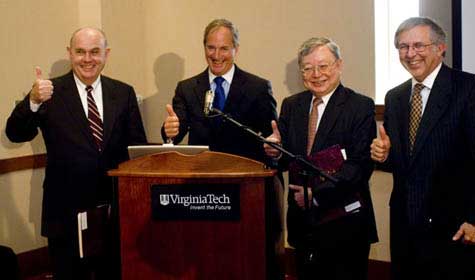Virginia Tech, University of Richmond Law School announce joint degree program

Editor's note: The program announced in this release is no longer offered. A minor for Science, Technology, and Law is available through the College of Science. See this page for more information.
Virginia Tech and the University of Richmond announced Thursday a new joint degree program that will enable students to earn both a Bachelor of Science degree and a law degree in as little as six years’ time, thus eliminating up to two years from their total time in school.
The program is a partnership between the College of Science at Virginia Tech and the T.C. Williams School of Law at the University of Richmond.
With planning and careful coordination of courses, students who want to take advantage of this partnership can potentially complete their coursework at Virginia Tech in three years and move directly into law school, completing their J.D. degree in another three years. Students who complete the program will have a specialization in intellectual property law, currently one of the fastest growing fields in law.
“Both of our schools will benefit, as will society, from well-educated students who have a strong academic grounding in the intersection of science and law,” Virginia Tech President Charles W. Steger said in making the announcement. “These students will be specially trained in both their undergraduate and law school years to address the rapidly evolving challenges facing law, science, and public policy in the arena of intellectual property. This is just another way Virginia Tech is inventing the future.”
Steger also noted that the initiative directly addresses a key recommendation in the state’s Higher Education Restructuring Plan. That recommendation is for schools to find ways to reduce the time it takes students to earn their degree. The partnership can eliminate up to two years from a student’s total time in school if each degree were sought separately.
“We anticipate this joint collaboration will enhance the quality of the University of Richmond Law School’s existing intellectual property program by bringing a critical number of highly qualified science students with a keen interest in intellectual property issues,” said Rodney A. Smolla, dean of the T.C. Williams School of Law.
“The College of Science is proud to be involved in one of only a handful of joint degree programs offered at Virginia Tech,” said Lay Nam Chang, Dean of the College of Science. “Science and technology will continue to shape our society and our future. As they do, we will rely more than ever on intellectual property law to control their impact. That is the key aspect of this unique educational initiative – the confluence of all three: technology, society and law.”
The College of Science at Virginia Tech gives students a comprehensive foundation in the scientific method. Outstanding faculty members teach courses and conduct research in biology, chemistry, economics, geosciences, mathematics, physics, psychology, and statistics. The college is dedicated to fostering a research intensive environment and offers programs in many cutting edge areas, including those in nanotechnology, biological sciences, information theory and science, and supports the university’s research initiatives through the Institute for Critical Technologies and Applied Sciences, and the Institute for Biomedical and Public Health Sciences. The College of Science also houses programs in pre-medicine and intellectual properties law.
University of Richmond’s T.C. Williams School of Law was founded in 1870 and accredited by the American Bar Association in 1928. A law degree from Richmond qualifies the holder to seek admission to the bar of any state and the District of Columbia. More than 450 full-time students are enrolled. Long regarded as a law school that emphasizes both the practice and theory of law, it has a history of producing judges, legislators and practicing attorneys of distinction who serve at the state and national levels. Student-focused faculty also write and publish widely in a variety of specialties. The law school’s location in Richmond and near Washington provides exceptional opportunities to observe federal and state judicial, legislative and administrative processes, as well as to gain clinical experience.



.jpg.transform/m-medium/image.jpg)
